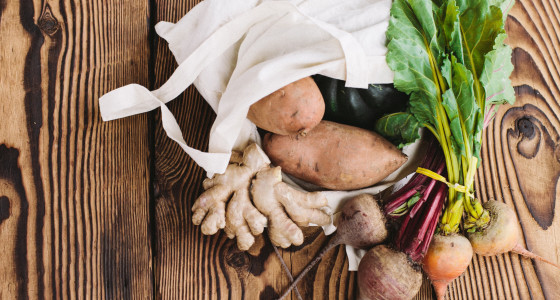
The UK wastes 7.3 million tonnes of food every year. This costs the average family £700 each year. Plus, if you’re mostly buying branded goods, you might be spending an extra £1,219 a year. So how can you ease the pressure on the planet – and on your wallet? Here are seven ways to make sure you’re getting the most out of your supermarket shop.
1. Buy what you need
Shops frequently put on special offers, like 2-4-1 deals, that seem like great value but don’t make sense in the long run. Most of us tend to buy more than we need and we end up with a lot of food that’s gone bad or gets forgotten in the back of the fridge. We also find it difficult to recognise a good deal over a bad one.
Mindful consumption habits can save you money
Pay attention to your food consumption at home. What do you always need more of, and what do you always seem to be throwing away? Being mindful of your consumption habits will help you to determine which deals actually work for you and your lifestyle, and which ones you’re better off ignoring.
2. Try own-brand products

Own-brand products sometimes carry stigma. There’s an assumption that own-brand means low-quality, but own-brand products consistently perform well in blind tests against big brand names. Plus, own-brand prices are usually only a fraction of their branded counterparts.
In fact, some own-brand products are made in the same factories as their big brand equivalents, which means you can sometimes get the exact same product for a much lower price if you buy own-brand.
3. Look down
We’re more inclined to buy whatever is most convenient to access. Supermarkets exploit our psychology by placing all the priciest stuff at eye-level and within hand’s reach. Cheaper products are often placed on the bottom shelf where you need to crouch a little to access it, or where you might not see it at all.
In addition, avoid the endcaps of aisles. These locations are the easiest for customers to access so they display the priciest products and the worst deals. Next time you go shopping, remember this sneaky bit of psychology, and try looking down to find some bargains.
4. Buy what will last and save the rest

A lot of the UK’s food waste comes from consumers binning items that have exceeded their expiry date. Avoid wasting food (and your money) by ensuring you only buy perishables when you need them, or by preparing excess for later.
Batch-cook your own freezer meals to avoid waste
Freezing food means that you only use what you need, when you need. You can freeze many staple foods, like bread, vegetables, and even some dairy products like butter and milk. Even better, try batch-cooking. This is where you make a meal in advance and then freeze the cooked meal, ready to be re-heated when you want it. This is like creating your own freezer meals – but you know exactly what’s inside and you’re saving a ton of money.
5. Always bring a bag
Since 5 October 2015, supermarkets are required to charge 5p for all single-use plastic carrier bags, in order to reduce litter and help the environment. Most of us have a ‘Bag For Life’ (or more than one!) which are a lot sturdier and entirely reusable. However, it can be easy to forget to bring your bag with you on your shop, and a bag stuck at home isn’t much use on an impromptu nip into the supermarket.
Keep one bag on you or somewhere convenient to make sure you’re always prepared and don’t need to fork out 5p (or the cost of another Bag For Life) each time you hit the shops. Try keeping a reusable bag in the boot of your car, or in your work bag in case you make a trip to the store on your way home.
Combine your old
pensions pots
into one new
online plan
Capital at risk

6. Compare prices before heading to the shops

It can be a real hassle going to a bunch of different supermarkets whenever you’re on your weekly shop. Save yourself time and annoying mental arithmetic by visiting a price comparison website before heading out to the shops.
Popular price comparison sites include Give As You Live, which will also send a donation to a UK charity of your choice, at no extra cost to you. This can help you plan your shop better and find the best prices in your local area.
Save time and money by using price comparison sites
7. Choose a basket instead of a trolley
Unless you’re planning a truly substantial shop, always opt for grabbing a basket instead of a trolley at the shops. Trolleys are bigger so our brains tend to see them as less full even when we’re buying a lot of stuff.
You’re more likely to be mindful of what you’re purchasing if you use a basket, but the best way to avoid overspending is to always bring a shopping list with you – and then stick to it! Your list will tell you exactly what you need and reduce the likelihood of impulse or excessive buying.
Do you have any money-saving tricks you like to use at the supermarket? Let us know in the comments box down below.









